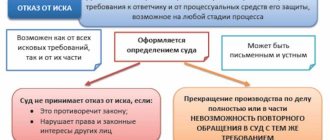Pre-trial dispute resolution. Claim procedure in arbitration proceedings
Expert consultation
Not all disputes can be resolved peacefully. If the counterparty does not pay on time, delivers low-quality goods, does not return the unpaid advance, and the negotiations do not bring results, then the next stage will be to resolve the dispute in court. Read more about claims work in the article by our expert Anastasia Chekmareva.
***
Claim work contains a large number of nuances. Before going to court, in some cases it is necessary to follow the procedure for pre-trial dispute resolution. If the mandatory pre-trial procedure for resolving the dispute is not observed, the court may return the statement of claim (Article 126, Article 128 of the Arbitration Procedure Code of the Russian Federation) or leave it without consideration (Article 148 of the Arbitration Procedure Code of the Russian Federation).
In recent years, much attention has been paid to resolving disputes out of court; back in 2021, procedural legislation identified a new task of legal proceedings - promoting the peaceful resolution of disputes (clause 6 of Article of the Arbitration Procedure Code of the Russian Federation). In the summer of 2021, the Supreme Court of the Russian Federation summarized the practice on the pre-trial procedure for resolving disputes, publishing a “Review of the practice of application by arbitration courts of the provisions of procedural legislation on the mandatory pre-trial procedure for resolving a dispute” (approved by the Presidium of the Supreme Court of the Russian Federation on July 22, 2020). The review provided answers to questions that did not have clear answers in procedural legislation.
A year later, in June 2021, the Supreme Court of the Russian Federation prepared new clarifications (Resolution of the Plenum of the Armed Forces of the Russian Federation dated June 22, 2021 N 18). On some issues, the position has changed; accordingly, when resolving disputes, the courts will be guided by the new rules.
Let's consider all the intricacies of claims work, taking into account the requirements of the law, the positions of the Supreme Court and current judicial practice.
When is pre-trial dispute resolution mandatory?
In the arbitration process, in the event of disputes regarding the recovery of funds for claims that arose from contracts, other transactions, as well as due to unjust enrichment, the pre-trial procedure for resolving disputes is mandatory (Part 5 of Article 4 of the Arbitration Procedure Code of the Russian Federation).
For other disputes arising from civil legal relations, compliance with the procedure for pre-trial dispute resolution becomes mandatory only if such a procedure is established by law or agreement.
In some cases, you can go to court without following the claims procedure, for example:
- in cases of establishing facts of legal significance;
- in bankruptcy cases;
- on corporate disputes;
- in cases of protection of the rights and legitimate interests of a group of persons;
- on disputes in the order of writ proceedings;
- on claims for foreclosure on mortgaged property;
- on claims against a subsidiary debtor in the absence of contractual relations;
- in cases of compensation for losses arising from harm;
- on claims with recourse claims for damages;
- when the amount of claims increases or decreases;
- when replacing the defendant or attracting a co-defendant;
- when a third party with independent demands enters into the case.
When filing a counterclaim, you can go to court without following the mandatory pre-trial procedure for resolving the dispute. This position was reflected in paragraph 24 of the Resolution of the Plenum of the Supreme Court of the Russian Federation dated June 22, 2021 N 18. The Supreme Court noted that since the counterclaim is filed after the initiation of proceedings in the case, the meaning of the pre-trial procedure is lost. This position contradicts the clarifications of 2021, where it was noted that the claim procedure can only be waived if the counterclaim is based on the same legal relations as the original claim, and the essence of the counterclaims is indicated in the response to the claim. Now, when resolving disputes, the courts will be guided by new clarifications.
If several plaintiffs are involved in the dispute and their claims can be considered independently, then filing a claim is mandatory for each of them (Part 3 of Article 46 of the Arbitration Procedure Code of the Russian Federation). If there are several defendants in the dispute, then all of them need to send claims (Articles 125, 126 of the Arbitration Procedure Code of the Russian Federation).
A claim can only be used once. For example: a claim is filed, which indicates the amount of debt and the penalty. Subsequently, a claim was filed to recover the amount of the debt. The court decision was made and entered into legal force. If you go to court with a separate claim for the collection of a penalty, you must send the claim again, otherwise the procedure for pre-trial settlement of the dispute will not be observed (clause 15 of the Resolution of the Plenum of the Armed Forces of the Russian Federation dated June 22, 2021 N 18).
What can replace a claim?
Filing a claim is not the only way to pre-trial dispute resolution. Other options are possible, such as negotiation or mediation. In the review of the practice of the Supreme Court dated July 22, 2020, it was noted that another conciliation procedure can be used instead of a claim if this is specified in the contract.
In 2021, the Supreme Court changed its position, and now the filing of a claim can be replaced by another conciliation procedure if the disputing parties agree, even if the corresponding procedure is not agreed upon in the contract (clause 20 of the Resolution of the Plenum of the Armed Forces of the Russian Federation dated June 22, 2021 N 18)
The following documents can prove compliance with the procedure for pre-trial settlement of disputes when using conciliation procedures instead of filing a claim (clause 19 of the Resolution of the Plenum of the Armed Forces of the Russian Federation dated June 22, 2021 N 18):
- protocol of disagreements;
- agreement of the parties to terminate the mediation procedure without reaching agreement on existing disagreements;
- statement of refusal to continue the mediation procedure.
If the parties have established in the agreement a pre-trial procedure for resolving disputes, and one of the parties has sent a proposal to conduct conciliation procedures, to which the other party has not responded within 30 days or the period established in the claim, then such a proposal is considered rejected and the claim procedure has been complied with.
How to file a claim?
Procedural legislation does not establish requirements for the form of a claim, but there are some nuances that are worth paying attention to.
The claim must state the requirement. If the letter is of an informational nature, then the court may recognize the claim procedure as not being followed. For example: you notified the counterparty of a penalty for late payment, but did not indicate the amount of the debt and did not demand to pay the debt and penalty.
The claims in the claim must be consistent with the requirements of the claim. For example, if in a claim you ask to replace a low-quality product, and in a claim to return an unpaid advance payment, then the claim procedure for claims is considered not to be complied with. But this moment concerns the requirements. If the amount of the principal debt, penalty, interest specified in the claim and in the statement of claim do not coincide, this does not indicate a failure to comply with the procedure for pre-trial settlement of the dispute. The amounts in the claim and in the claim may also differ due to an arithmetic error (clause 11 Review of practice, approved by the Presidium of the RF Armed Forces on July 22, 2020).
Non-critical errors may also be in the requirement itself. Let's consider the decision of the Arbitration Court of the Central District dated December 16, 2020 N F10-4912/2020 in case N A68-2307/2020. The claim indicated the presence of a debt under Appendix 1 to the contract, and the debt was under Appendix 2. In the first instance, the statement of claim was returned due to non-compliance with the pre-trial procedure for resolving the dispute. The appeal did not agree: the mere presence of two annexes to the said agreement with a different list of services does not mean the need to file claims for each separate application; the claim may not contain reference to any specific annex to the contract.
The law or contract may establish requirements for documents that must be attached to the claim, but in some cases their absence is not critical. The procedure for pre-trial settlement of a dispute is considered to be complied with if (clause 17 of the Resolution of the Plenum of the Armed Forces of the Russian Federation dated June 22, 2021 N 18):
- The documents presented by the plaintiff clearly indicate the essence and size of the stated claims
- the defendant has the missing documents and information
- the defendant is a government body, and it has documents, or it can obtain them through interdepartmental interaction
- the defendant, in the cases established by law, did not report the absence of necessary documents or their incorrect execution.
Where and how to send a claim?
The most common way to submit a claim is to send it by mail to the defendant’s address indicated in the Unified State Register of Legal Entities (USRIP). The claim does not have to be sent in a valuable letter with a description of the attachment, unless required by law or contract. This position is noted in paragraph 9 of the Review of Practice, approved. by the Presidium of the RF Armed Forces on 07.22.2020 and enshrined in clause 12 of the Resolution of the Plenum of the RF Armed Forces dated 06.22.2021 N 18.
If a claim is sent by mail, evidence of compliance with the procedure for pre-trial dispute resolution may be a postal receipt and a list of the contents when sent by mail, a receipt notification, and tracking information for the shipment.
Procedural legislation allows other ways of filing a claim. The claim can be delivered by hand or sent by courier service. Confirmation of delivery of the claim may include, among other things, a signature, transcript and entry number on a copy of the claim, or a signature and transcript on the delivery note for the transfer of documentation. In this situation, it is necessary to check the authority of the person who accepted the document. If the documents were accepted by an unauthorized person, this may indicate non-compliance with the procedure for pre-trial dispute resolution.
The claim can be sent not only to the legal address, but also to the address specified in the contract (clause 4 of the Review of Practice, approved by the Presidium of the RF Armed Forces on July 22, 2020). If the address for sending the claim is fixed in the contract, this can help, including if the debtor’s address changes. Let's consider the decision of the Arbitration Court of the North-Western District dated October 19, 2020 N F07-12754/2020 in case N A56-29806/2020.
The plaintiff sent a claim to the defendant at the address specified in the contract. The defendant's address indicated in the Unified State Register of Legal Entities changed after the conclusion of the contract, but the defendant did not notify the plaintiff of this fact. The court of first instance returned the statement of claim due to the fact that the plaintiff did not provide evidence of sending the claim to the address indicated in the Unified State Register of Legal Entities. The appellate court upheld the findings of the trial court. The cassation court did not agree with the conclusions of the lower courts: the claim was sent to the address specified in the contract; a discrepancy between the addresses in the contract and in the Unified State Register of Legal Entities does not mean that the sender of the claim acted in bad faith. The case was sent to the court of first instance for proceedings.
If a dispute arises with the participation of a branch (representative office) of the defendant, then it is permissible to send the claim to the address of the branch, and not the parent organization. This is possible if the claims arise from relations related to the activities of the branch (representative office). The position is enshrined in paragraph 11 of the Resolution of the Plenum of the Armed Forces of the Russian Federation dated June 22, 2021 N 18. Previously, there was no clear position of the courts on this issue. Let's consider in practice: Resolution of the Arbitration Court of the North-Western District dated March 18, 2021 N F07-989/2021 in case N A56-37596/2020.
The claim was sent to the address of the branch, but the courts considered that the claim procedure was not followed due to the fact that there was no information about whether the defendant’s branches had the authority to resolve pre-trial issues. The opposite position can be seen in the Resolution of the Arbitration Court of the Far Eastern District of August 20, 2020 N F03-3095/2020 in case N A04-8115/2019. The filing of a claim by the plaintiff at the place of legal registration of the branch is not a violation of the claims procedure established by law if the dispute is related to its activities.
The claim can be sent by email, via a social network or instant messenger, if the following procedure:
- established by regulatory legal act
- clearly and unambiguously provided for in the contract
- This method of correspondence is a common established business practice between the parties and previously the exchange of correspondence was carried out, including in this way.
Evidence of sending a claim can be a screenshot that shows the exact time it was received and the address of the page on the Internet. A participant in the process can independently certify the screenshot (clause 13 of the Resolution of the Plenum of the Armed Forces of the Russian Federation dated June 22, 2021 N 18).
Keep evidence of the complaint. When filing a claim, you will need to provide them along with other required documents. Failure to provide confirmation of compliance with the pre-trial procedure for resolving a dispute is grounds for leaving the statement of claim without progress (clause 13 of the Review of Practice, approved by the Presidium of the RF Armed Forces on July 22, 2020).
What is the deadline to respond to a complaint?
When filing a claim, you must wait for the response period and only after the expiration of this period go to court, otherwise the pre-trial procedure for resolving the dispute will not be followed.
The Arbitration Procedure Code of the Russian Federation establishes a deadline for responding to a claim - 30 calendar days (Part 5 of Article 4 of the Arbitration Procedure Code of the Russian Federation). But a different period may be established by law or contract. For example, in the event of a dispute regarding an appeal against a decision to refuse state registration of legal entities and individual entrepreneurs, the period for responding to a claim is 15 calendar days (paragraph 2, paragraph 1, article 25.2 of the Federal Law of 08.08.2001 N 129-FZ “On State Registration of Legal Entities and individual entrepreneurs").
The response period established in the contract may be either shorter or longer than the period established by law. If you specify a response period of 60 calendar days in your complaint, but go to court after 30 (as specified in the APC), the claim procedure will not be followed.
In practice, there are situations when, after filing a claim, the debtor partially satisfies the requirements. For example: the claim indicates the amount of debt is 100,000 rubles, the debtor paid 100 rubles. Do I need to resubmit my claim? The answer to this question is in paragraph 15 of the Review of Practice, approved. By the Presidium of the Armed Forces of the Russian Federation on July 22, 2020. For requirements that have changed since the filing of the claim, including: the defendant has partially repaid the debt, a new billing period has been added, or the number of days of delay has increased, it is not necessary to follow the pre-trial procedure for resolving the dispute if it was followed in relation to the initially stated requirements.
For the period of actual compliance with the claim procedure, the limitation period is suspended, that is, from the moment the claim is submitted until the moment it is refused.
When can you report non-compliance with the claim procedure?
If the court accepted the statement of claim for consideration, and the defendant claims that the pre-trial procedure for resolving the dispute was not followed, then the court will accept this argument only in the first instance. This was noted in paragraph 18 of the Review of Practice, approved. By the Presidium of the Armed Forces of the Russian Federation on July 22, 2020.
In 2021, the Supreme Court detailed these clarifications (clause 28 of the Resolution of the Plenum of the Armed Forces of the Russian Federation of June 22, 2021 N 18). The defendant’s request to leave the claim without consideration due to the plaintiff’s failure to comply with the pre-trial procedure for resolving the dispute may be rejected even in the first instance if:
- The petition was filed no later than the day the defendant submitted the first statement on the merits of the dispute, and the defendant expressed his intention to resolve it
- At the time of filing this petition, the period for pre-trial settlement established by law or contract has not expired and there is no response to the appeal or other document confirming compliance with such a settlement.
What happens if the claim procedure is not followed?
If the plaintiff did not submit a claim or filed a statement of claim before the expiration of the deadline for responding to the claim, in the case where he was obliged to comply with the mandatory pre-trial procedure for resolving the dispute, the following negative consequences are possible:
- The fact was discovered before the statement of claim was accepted for proceedings - the court will leave the claim without progress, and then return it (part 1 of Article 128, paragraph 5 of part 1 of Article 129 of the Arbitration Procedure Code of the Russian Federation).
- The fact is that after the statement of claim is accepted for proceedings, the claim will be left without consideration (clause 2 of part 1 of Article 148 of the Arbitration Procedure Code of the Russian Federation).
The ConsultantPlus reference and legal system will help you avoid mistakes in complying with the mandatory claims procedure.
In ConsultantPlus you can find step-by-step instructions, samples of filling out claims and responses to claims, as well as collections of current judicial practice.
Question:
The claim indicates the amount of the claims, but there is no appendix with a calculation. Will such a claim indicate compliance with the mandatory pre-trial dispute resolution procedure?
Answer:
Yes, such a claim will indicate compliance with the mandatory pre-trial dispute resolution procedure.
The complaint must set out the demands against the defendant. Procedural legislation does not establish additional requirements for the form and content of a claim. This position is confirmed by judicial practice: Resolution of the Arbitration Court of the Moscow District dated November 18, 2020 N F05-20430/2020 in case N A40-97229/2020.
The plaintiff was supplied with low-quality goods, he independently eliminated the defects and filed a lawsuit to recover damages. Before going to court, the plaintiff sent a claim to the defendant, indicating the amount and basis of the claims, but did not attach a calculation. In the first instance, the claim was left without consideration due to the plaintiff’s failure to comply with the procedure for pre-trial settlement of the dispute. The appeal upheld the ruling. The Cassation Board did not agree with the conclusions of the lower courts: for the purposes of taking and complying with measures for pre-trial settlement of the dispute, the procedural law has not established a mandatory attachment to the claim for calculating damages. The case was sent for a new trial.
Previously, we reported that the Supreme Court of the Russian Federation summarized the practice of observing the pre-trial procedure for resolving disputes.
Anastasia Chekmareva, teacher-lawyer at “What to do Consult” LLC
Address and method of filing a claim
The law does not contain regulation on the issue of address for sending a claim. Thus, it can be sent to the party to the contract in any available way that ensures its receipt. It can be sent: by Russian Post, courier service or express. In accordance with established practice, the acceptable address for sending a claim is the address of the party indicated in the Unified State Register of Legal Entities or the Unified State Register of Individual Entrepreneurs, as well as the address indicated in the agreement itself.
When the claim documentation is sent by mail, the best option would be to make an inventory of all attachments. The fact is that the court may consider that if there was no inventory of documents, then it is impossible to reliably establish which papers were sent. Those. in this case, it will be extremely difficult to prove the fact that the demands were sent to the responding party. At the same time, there were cases (resolution of the Moscow District Court of February 9, 2017 No. F05-1104/2017 in case No. A41-59746/16) when the court did not consider the inventory necessary. In any case, a registered letter with an inventory will help quickly clarify this issue in court.
The best option is to hand over the demands to the defendant in person against signature.
What if your claim is denied?
If the claim you made is rejected, or the letter remains unanswered, the next step in resolving the conflict will be to go to court. There is no need to rush to file a claim in court. Wait until the deadline for reviewing the claim expires and then begin preparing for legal proceedings.
To defend your interests in court, do not neglect the help of competent lawyers from RosCo. Contact the professionals! We are waiting for your call right now!





